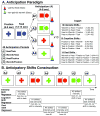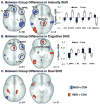Right anterior insula hypoactivity during anticipation of homeostatic shifts in major depressive disorder
- PMID: 20100882
- PMCID: PMC2884370
- DOI: 10.1097/PSY.0b013e3181d07873
Right anterior insula hypoactivity during anticipation of homeostatic shifts in major depressive disorder
Abstract
Objective: To use functional magnetic resonance imaging (fMRI) to examine how shifts in homeostatic state affect anticipatory insular activity in major depressive disorder (MDD). An intact ability to mount preparatory emotional, cognitive, and bodily responses to anticipated environmental change is necessary for adaptive responding. Although abnormal insula activity during aversive anticipation has been observed in individuals with MDD, the extent to which shifts in homeostatic state during anticipation affect insular activity in MDD subjects has not been reported.
Methods: Cued hot and warm stimuli were delivered as subjects either passively viewed a fixation cross or performed an attentional task during fMRI. The task was designed so that anticipatory brain activation related to the following three types of shifts could be measured: 1) anticipatory shifts in stimulus intensity; 2) anticipatory shifts in cognitive demand; and 3) dual anticipatory shifts (i.e., shifts in both stimulus intensity and cognitive demand). Brain activation related to each of these three contrasts was compared between 15 (12 females) unmedicated subjects with current MDD and 17 (10 females) age- and education-comparable healthy control (HC) subjects.
Results: MDD vs. HC subjects showed lower right anterior insula activity related to anticipatory shifts in stimulus intensity, and altered brain activation during anticipatory shifts in cognitive demand and dual anticipatory shifts.
Conclusions: These results indicate that MDD individuals show altered brain responses to shifts in homeostatic state during anticipation, and may suggest that MDD is associated with an impaired ability to effectively prepare for changes in the environment.
Figures



Similar articles
-
Association of major depressive disorder with altered functional brain response during anticipation and processing of heat pain.Arch Gen Psychiatry. 2008 Nov;65(11):1275-84. doi: 10.1001/archpsyc.65.11.1275. Arch Gen Psychiatry. 2008. PMID: 18981339 Free PMC article.
-
Decreased frontal regulation during pain anticipation in unmedicated subjects with major depressive disorder.Transl Psychiatry. 2013 Mar 12;3(3):e239. doi: 10.1038/tp.2013.15. Transl Psychiatry. 2013. PMID: 23481626 Free PMC article.
-
Anxiety positive subjects show altered processing in the anterior insula during anticipation of negative stimuli.Hum Brain Mapp. 2011 Nov;32(11):1836-46. doi: 10.1002/hbm.21154. Epub 2010 Dec 22. Hum Brain Mapp. 2011. PMID: 21181800 Free PMC article.
-
Pain and emotion in the insular cortex: evidence for functional reorganization in major depression.Neurosci Lett. 2012 Jun 29;520(2):204-9. doi: 10.1016/j.neulet.2012.03.095. Epub 2012 Apr 6. Neurosci Lett. 2012. PMID: 22503725 Review.
-
A meta-analysis of neurofunctional imaging studies of emotion and cognition in major depression.Neuroimage. 2012 Jul 2;61(3):677-85. doi: 10.1016/j.neuroimage.2012.04.005. Epub 2012 Apr 12. Neuroimage. 2012. PMID: 22521254 Review.
Cited by
-
The Altered Triple Networks Interaction in Depression under Resting State Based on Graph Theory.Biomed Res Int. 2015;2015:386326. doi: 10.1155/2015/386326. Epub 2015 Jun 9. Biomed Res Int. 2015. PMID: 26180798 Free PMC article. Clinical Trial.
-
Fear induced neuronal alterations in a genetic model of depression: an fMRI study on awake animals.Neurosci Lett. 2011 Feb 4;489(2):74-8. doi: 10.1016/j.neulet.2010.11.069. Epub 2010 Dec 4. Neurosci Lett. 2011. PMID: 21134416 Free PMC article.
-
Impact of serotonergic medication on interoception in major depressive disorder.Biol Psychol. 2022 Mar;169:108286. doi: 10.1016/j.biopsycho.2022.108286. Epub 2022 Feb 8. Biol Psychol. 2022. PMID: 35149138 Free PMC article.
-
Understanding Pain and Trauma Symptoms in Veterans From Resting-State Connectivity: Unsupervised Modeling.Front Pain Res (Lausanne). 2022 May 10;3:871961. doi: 10.3389/fpain.2022.871961. eCollection 2022. Front Pain Res (Lausanne). 2022. PMID: 35620636 Free PMC article.
-
Women with Major Depressive Disorder, Irrespective of Comorbid Anxiety Disorders, Show Blunted Bilateral Frontal Responses during Win and Loss Anticipation.J Affect Disord. 2020 Aug 1;273:157-166. doi: 10.1016/j.jad.2020.04.064. Epub 2020 May 11. J Affect Disord. 2020. PMID: 32421596 Free PMC article.
References
-
- Bylsma LM, Morris BH, Rottenberg J. A meta-analysis of emotional reactivity in major depressive disorder. Clin Psychol Rev. 2008;28:676–91. - PubMed
-
- Carroll D, Phillips AC, Hunt K, Der G. Symptoms of depression and cardiovascular reactions to acute psychological stress: evidence from a population study. Biol Psychol. 2007;75:68–74. - PubMed
-
- Craig AD. How do you feel? Interoception: the sense of the physiological condition of the body. NatRevNeurosci. 2002;3:655–66. - PubMed
-
- Craig AD. Interoception and emotion: a neuroanatomical perspective. In: Lewis M, Haviland-Jones JM, Barrett LF, editors. Handbook of Emotions. 3. New York: Guilford Publications; 2008. pp. 272–88.
Publication types
MeSH terms
Grants and funding
LinkOut - more resources
Full Text Sources

